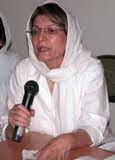Grieving Mothers Not Deterred by Armed Suppression
» Khadijeh Moghadam Talks with Rooz:
A year and a half after the mothers of victims of the presidential election protests in Iran formed the group Grieving Mothers (aka Mothers of Laleh Park), they are now under growing suppression. Only during last week several group members and supporters were summoned to Iran’s Intelligence Ministry. And while two member mothers, Akram Zeinali, the mother of Saeed Zeinali, and Jaleh Mahdavi, the mother of Hesam Tarmasi, were released on bail, two supporters, Neda Mostaghimi and Hakimeh Shekari, are still held in detention.
But the question is why the non-violent activities of the Grieving Mothers are perceived by the government as a security threat? Why some of the arrested mothers have been pressured to make televised confessions? The following is an excerpt of an interview that Rooz had with Khadijeh Moghadam, a member of the Committee of Mothers for Peace and an active member of the Grieving Mothers.
Rooz: How did the Grieving Mothers come to life as a group amidst the tumultuous waves of protest to the election results and the ensuing killings and widespread arrests?
Mrs. Moghadam: Witnessing our children being arrested or killed on the streets, some mothers felt the urge to do something. Then the video of Neda’s death touched us deeply as if this tragic event happened to our own children. Meanwhile news of torture put us on edge to take action. After some discussions we concluded that we should take a “motherly” action, something non-political for none of us were political activists of any sort.
Rooz: You initially demanded the release of arrested protestors and the end to violence? So these were the goals of your call to action?
Mrs. Moghadam: We asked for the freedom of political prisoners, the release of all those young men and women who got arrested during the protests plus the prosecution of the commanders and perpetrators of those killings. We all witnessed on the streets that our people were not violent; rather it all came from the police and Basij groups against whom our youth had to defend themselves somehow. We would go to street protests and while people were voicing their demands and wanted their votes back we would put ourselves between the police and demonstrators to urge them not to beat or shoot for these were our own children. We were constantly trying to have a dialogue with armed police and even with militia groups. In fact, I like to emphasize that to put a stop to violence was the main reason for us to form such a group.
Rooz: And within the very first week of your call to action several mothers were arrested and the suppression started, right?
Yes, they caught twenty mothers in the first week. This coincided with widespread interest in our activities and despite the arrests, others wanted to push forward. Our movement did not start by any founding member and it has moved on through park gatherings, brainstorming, and co-operation among mothers.


